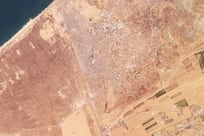Yaslam Omar Hassan Al Braiki saw plastic bags blowing around the picnic spots in the desert almost every year.
For a long time, he did not realise how harmful they were to the environment but once he did he wanted to do something about it.
So Mr Al Braiki decided to leave his job as a procurement officer for an oil company in 2010 and set up a factory in Al Ain that manufactures biodegradable plastic grocery and rubbish bags.
"We studied this [market] well before we started this factory," says Mr Al Braiki, the founder of Al Salam Plastic Factory. "I visited many plastics factories in the UAE and decided to focus environmentally friendly bags."
The timing could not have been better. Last year, the Emirates Authority for Standardisation and Metrology (Esma) announced that biodegradable plastic bags would be mandatory from next year. Since then, businesses have grown up around the sector, including the Al Salam Plastic Factory, and Eco-Polymers, which distributes chemicals for the industry.
About 12 billion plastic bags are used in the UAE every year, according to a study conducted by the Ministry of Environment and Water and the marketplace is highly-competitive.
"There are currently 95 biodegradable plastic bag manufacturers registered with Esma," says Harold Grecia Orona, a conformity and quality officer at the agency.
The Abu Dhabi Government helped Mr Al Braiki, an engineer, acquire land for his factory in Al Ain two years ago and he received Dh3 million (US$816,780) from the Khalifa Fund for Enterprise Development.
"There is a lot of competition in the market but I work with [competitors] to complement them, I work hard on quality and delivery on time at a reasonable price," says Mr Al Braiki, 45.
His customers already include the Abu Dhabi National Oil Company, the Abu Dhabi Co-operative Society and Lulu, which buy their grocery bags from his factory that was started with five workers and now has 21 staff.
As one of the small to medium-sized businesses supported by the Khalifa Fund, Al Salam Plastic Factory is looking to expand by recycling old bags and selling biodegradable ones abroad.
But bags are just one plastic product among many that can harm the environment.
"People get emotional about plastic bags but most of their [weekly shop includes] plastic," says Winston Pryce, who started manufacturing biodegradable plastic bags back in 2001.
An engineer, he was the managing director of the plastic products manufacturer Bin Hilal Enterprises in Abu Dhabi before setting up Eco-polymers in Sharjah.
A decade ago, the additives that made plastic bags biodegradable doubled the cost of the finished product.
But today, one of the additives, called d2w, which Mr Pryce's factory distributes, "costs less than 15 per cent of the [price] of the bag". Eco-Polymers, which imports the product into the Middle East from the British supplier Symphony Environmental Limited, was launched in 2008 with 10 clients. Symphony is one of four suppliers of such additive approved by the UAE Government.
Mr Pryce caters for the majority of the 95 biodegradable plastic bag factories in the Emirates, although he declines to say how many.
But he does say his business is ripe for growth, just like the Al Salam Plastic Factory.
"I am going to purchase machines for recycling of the plastic bags," says Mr Al Braiki.
"We are studying the overseas markets for export of biodegradable plastic bags and I have found opportunities."
[ ssahoo@thenational.ae ]





